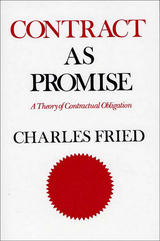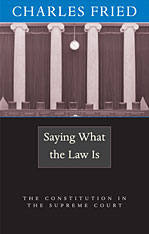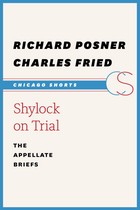
This book displays the underlying structure of a complex body of law and integrates that structure with moral principles.
Charles Fried grounds the basic legal institution of contract in the morality of promise, under which individuals incur obligations freely by invoking each other's trust. Contract law and the promise principle are contrasted to the socially imposed obligations of compensation, restitution, and sharing, which determine the other basic institutions of private law, and which come into control where the parties have not succeeded in invoking the promise principle--as in the case of mistake or impossibility. Professor Fried illustrates his argument with a wide range of concrete examples; and opposing views of contract law are discussed in detail, particularly in connection with the doctrines of good faith, duress, and unconscionability.
For law students and legal scholars, Contract asPromise offers a coherent survey of an important legal concept. For philosophers and social scientists, the book is a unique demonstration of the practical and detailed entailments of moral theory.

Some acts are wrong, even if they have good results, and some are right even if the world would have been a better place without them. Here is a cogent and lucid argument for a system of morality that makes place for that which is right or wrong in itself and not just according to consequences. Charles Fried develops in this book a conception of right and wrong that supports judgments on subjects as various as tax structure, self-defense, kidney transplants, tort liability, and freedom of speech.
Fried begins by examining the demands of morality in two quite different cases: harming the innocent (where ordinary moral consciousness suggests absolutes) and lying (where consequences seem pertinent). Upon this foundation he elaborates a theory of rights that accounts for the obligation to contribute to the welfare of others but accounts also for the limits of that obligation. Comparisons and contrasts are drawn to economic theories of rights, and to the writings of Dworkin, Nozick, and Rawls. Finally, Fried considers how choices made within personal and professional roles—by friends and kin, by doctors and lawyers—are susceptible of moral judgment.
Right and Wrong will have an impact on ethical, legal, and social theory, and will profit anyone thinking about the requirements of a moral life.

In a few thousand words the Constitution sets up the government of the United States and proclaims the basic human and political rights of its people. From the interpretation and elaboration of those words in over 500 volumes of Supreme Court cases comes the constitutional law that structures our government and defines our individual relationship to that government. This book fills the need for an account of that law free from legal jargon and clear enough to inform the educated layperson, yet which does not condescend or slight critical nuance, so that its judgments and analyses will engage students, practitioners, judges, and scholars.
Taking the reader up to and through such controversial recent Supreme Court decisions as the Texas sodomy case and the University of Michigan affirmative action case, Charles Fried sets out to make sense of the main topics of constitutional law: the nature of doctrine, federalism, separation of powers, freedom of expression, religion, liberty, and equality.
Fried draws on his knowledge as a teacher and scholar, and on his unique experience as a practitioner before the Supreme Court, a former Associate Justice of the Supreme Judicial Court of Massachusetts, and Solicitor General of the United States to offer an evenhanded account not only of the substance of constitutional law, but of its texture and underlying themes. His book firmly draws the reader into the heart of today's constitutional battles. He understands what moves today's Court and that understanding illuminates his analyses.

READERS
Browse our collection.
PUBLISHERS
See BiblioVault's publisher services.
STUDENT SERVICES
Files for college accessibility offices.
UChicago Accessibility Resources
home | accessibility | search | about | contact us
BiblioVault ® 2001 - 2024
The University of Chicago Press









